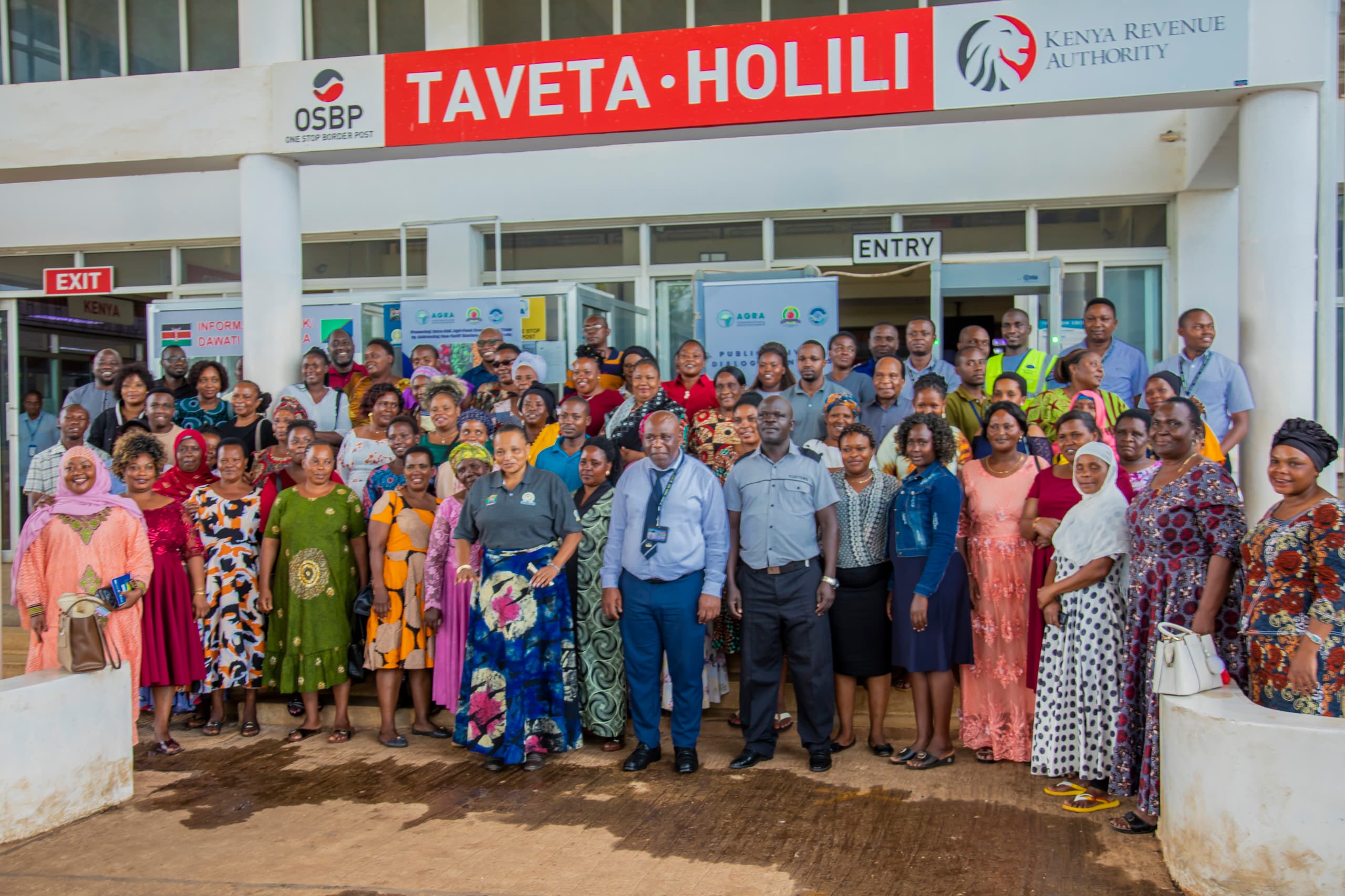Holili-Taveta, 2nd December 2024 — The East African Business Council (EABC), in partnership with AGRA, successfully kicked off public private dialogue on Non-Tariff Barriers (NTBs) and enhanced the capacity of 60 women and youth cross-border traders under the EAC Simplified Trade Regime. This initiative, implemented under the project titled “Promoting Intra-EAC Agri-Food Cross-Border Trade by Addressing NTBs”, has set up a roadmap to address NTBs at the Taveta-Holili One-Stop Border Post (OSBP).
During the Public-Private Dialogue on NTBs held at Taveta-Holili OSBP, Mr. Frank Dafa, representing the EABC Acting Executive Director, Mr. Adrian Njau commended the East African Community (EAC) for marking 25 years. He lauded the EAC Simplified Trade Regime for streamlining documentation and reducing formalities for imports and exports. These measures have significantly lowered transaction costs for small-scale traders, particularly women and youth. Notably, under EAC Simplified Trade Regime consignments valued at under USD 2,000 are exempt from import duty in the EAC destination country, improving greater participation in trade for women and youth.
Mr. Dafa emphasized the need for EAC governments to improve transparency in trade steps, procedures and levies to allow more women and youth to leverage the Simplified Trade Regime and enhance their livelihoods.
The Public-Private Dialogue brought together 80 stakeholders, composed of 60 women and youth cross-border traders, trade facilitation agencies at the border, and officials from the Tanzania Ministry of Industry and Trade, the Tanzania Ministry of Foreign Affairs and East African Cooperation, and the Kenya Ministry of East African Community, Arid and Semi-Arid Lands (ASALs), and Regional Development. Tanzania has 21 trade facilitation agencies, while Kenya has 18 operating at the Taveta/Holili border.
According to the Tanzania Revenue Authority, the Holili/Taveta border processes 297 monthly import declarations from Kenya to Tanzania and 200 export declarations. 763 monthly baggage assessments (value added goods) were imported and 40 exported under the EAC Simplified Trade Regime. Kenya Revenue Authority’s Official, noted that the border operates 24/7 for perishable goods and passengers, with trucks being served until 11:00 PM. The Holili/Taveta border, the first One-Stop Border Post (OSBP) established in the East African Community, hosts quarterly joint border management committee meetings to enhance collaboration and coordination in cross border operations.
The EAC Secretariat provided practical training to cross-border traders on using the EAC NTB Reporting Mobile App, a tool designed to help traders report barriers to trade for resolution. Ms. Joyce Ndosi, Chairperson of the Kilimanjaro-Tanzania Women Chamber of Commerce, highlighted the advantages of the iSOKO online B2B platform, which connects women with potential clients and fosters trade opportunities. Meanwhile, Equity Bank Tanzania presented financial solutions tailored to the needs of women traders. EASSI, a regional organization promoting women’s economic empowerment, has successfully established cross-border trade cooperatives in Kenya and Tanzania and called for the establishment of a fully operational trade information help desk on the Taveta side, similar to the one in Tanzania.
The EAC Simplified Certificate of Origin issued by Customs has eased access and usage; however, youth and women cross-border traders still grapple with unclear fees and levies imposed by other trade facilitation agencies. These includes high road tolls and levies, including USD 12 in Tanzania and KSh 1,560 in Kenya. Additional fees in Kenya include KEPHIS phytosanitary certificates costing KSh 600, KEBS moisture checks at KSh 1,293, and aflatoxin tests priced at KSh 5,800 plus a 25% excise duty on onions exported to Kenya. Tanzania imposes a 0.1% consignment value fee for radiation checks. Resolving these challenges is critical to stop small scale cross border youth and women traders in using un-gazetted routes.
Furthermore, system failures impacting payment delays for road tolls, booking RECTS Seal and unsynchronized systems between Rwanda and Tanzania since September 2024, hinder smooth operations for clearing and forwarding agents.
Another challenge lies in meeting standards for labeling, packaging, and value addition. The Tanzania Small Industries Development Organization (SIDO) has been tasked with equipping traders with the necessary skills to meet these requirements.
The dialogue concluded with a commitment by Trade Facilitation Agencies to address these challenges during the Joint Border Management Committee meetings and to further promote cross-border trade by streamlining procedures. EABC is steadfast in presenting key policy recommendations from the Public-Private Dialogue to EAC Technical Committees for policy reforms.
For women and youth engaged in cross-border trade to fully maximize the opportunities provided by the EAC Simplified Trade Regime (STR), all trade facilitation agencies should publish clear and accessible information on steps, procedures, and levies applicable to most traded goods under the STR. The EAC bloc should expand the One Network Area for Telecommunication to include affordable data roaming, enable free movement of persons using national IDs, and harmonize domestic taxes to boost regional integration and trade. This is crucial to ensuring trade benefits women and youth, not only within the EAC but also to improve their competiveness under the African Continental Free Trade Area.
About East African Business Council: The East African Business Council (EABC) is the regional apex body of private sector associations and Corporates from the 8 East African countries. It was established in 1997 to foster the interests of the private sector in the integration process of the East African Community. EABC vision is a borderless East Africa for business and investment. The primary mission is to promote sustainable private sector-driven growth in the EAC. www.eabc-online.com
About AGRA
AGRA is an African-led organisation focused on putting farmers at the centre of the continent’s growing economy. AGRA advances uniquely African solutions to sustainably raise farmers’ productivity and connect them to a growing marketplace. Together with its partners—including researchers, donors, African governments, the private sector, and civil society—AGRA seeks to create an environment where Africa sustainably feeds itself.







